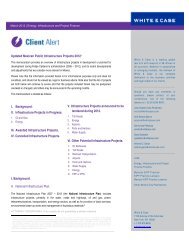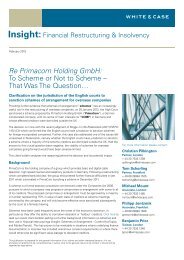Mexican Legal Framework of Business Insolvency - White & Case
Mexican Legal Framework of Business Insolvency - White & Case
Mexican Legal Framework of Business Insolvency - White & Case
Create successful ePaper yourself
Turn your PDF publications into a flip-book with our unique Google optimized e-Paper software.
33. Securities Market 84<br />
Holders <strong>of</strong> publicly traded debt securities are generally represented through indenture<br />
trustees. The indenture trustee has broad authority to exercise all actions and rights<br />
on behalf <strong>of</strong> the debt holders, carry out all corresponding conservatory actions, and<br />
enter into documents and agreements with the debtor on behalf <strong>of</strong> the security<br />
holders [LGTC 217-VIII, XII].<br />
The level <strong>of</strong> authority <strong>of</strong> the indenture trustee raises two important issues. The first issue is<br />
whether the indenture trustee has sufficient authority to enter into a standstill agreement<br />
in a private workout. An argument can be made that the standstill agreement constitutes<br />
a conservatory act (lack <strong>of</strong> cooperation in the private workout could frustrate attempts to<br />
reorganize) and therefore, within its scope <strong>of</strong> authority; however, there are compelling<br />
arguments to the contrary (the indenture trustee must seek repayment and has no duty with<br />
the other creditors). Since there is no specific authority to enter into a standstill agreement<br />
and carry out interim actions, in practice, indenture trustees will call a meeting <strong>of</strong> security<br />
holders to resolve whether to enter into standstill agreements. This practice causes delays<br />
and multiplies the opportunities for miscommunication and opposition to the reorganization<br />
process. In practice, some security holders choose to allow their custodians to represent<br />
them in the holders’ meetings, which mitigates (but does not eliminate) the problem.<br />
The second issue is whether the indenture trustee will be able to accept a rescheduling<br />
agreement or a reorganization plan on behalf <strong>of</strong> security holders. A statutory provision<br />
requires the approval <strong>of</strong> the security holders’ meeting to consent to extensions or carry out<br />
“any other amendment” to the debt instrument (“any other amendment” is considered to<br />
include a change in the covenants in general but does not include a change in the financial<br />
conditions, which shall be a decision <strong>of</strong> the individual holders and not the subject matter <strong>of</strong><br />
84 This section does not address securities market issues from jurisdictions other than Mexico. Mendales (1993)<br />
provides an in-depth analysis <strong>of</strong> restructuring public debt, which the reader is encouraged to consult.<br />
<strong>White</strong> & <strong>Case</strong><br />
115
















